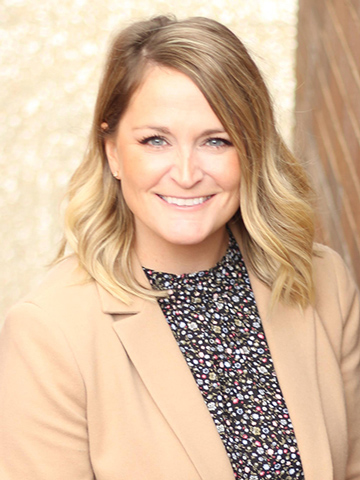Professor Marcea Walter Finds Calling in Classroom, Shapes Future of Health Care Management Through Students
Assistant Professor Marcea Walter’s career has always pointed her back to teaching.
As Director of Admissions and Director of Accreditation for the Master of Health Administration program, Walter is called to immerse herself in each students’ world.
She knows first-hand the struggles, decisions, and uncertainty that each student faces. Originally a business degree seeking student, Walter unexpectedly pivoted to the healthcare field as an undergrad because of a unlikely mentor.

Walter tells the story of a professor that scared her away from her original degree plans. Walter made the switch to the radiology program but was unable to start the program right away and decided to take a healthcare management course, on a whim.
On the first day in her new course, that same professor walked in to teach the course. What followed was a mentorship that blossomed because Walter liked the subject matter and saw value in the opportunity.
“It was something that I really liked, and it was intriguing to me,” Walter said of the health management course. “So, I made that promise to myself and I never looked back.”
Now, Walter’s career in academia has come full circle as she fills a similar role in the life of her students.
After earning her bachelor’s degree from Southern Illinois University-Carbondale and a M.H.S.A. from Xavier University, Walter made a few career stops throughout the Midwest. She worked in facilities for specialty providers and fulfilled management roles in specialty clinics.
She then found her way to Saint Louis University.
Since at SLU, Walter says that teaching has been the most fruitful and important medium for her to foster connections with students going through similar experiences to hers.
“(At SLU) I’ve learned the different levels, and how to connect with graduate-level students and what their expectations are and how to meet their expectations,” she said.
Walter expresses how fortunate she feels to be able to work with students.
The most rewarding part for Walter is when students see the return on their investments after graduating and succeeding in the health care management workforce.
“I’m just really fortunate and grateful that I get to do something that I enjoy and love,” she said. “It makes me super proud when I can see the students be successful.”
As Walter continues to support student success, she keeps a watchful eye on the industry and how changes play a role in that student outcome.
While the pandemic brought on further advancements in telehealth, data, analytics and health care technologies, a greater demand from students entering the field was also created.
She expressed a need to adapt to the changes, adapt the curriculum to make room for those changes, and understand the increase in patient awareness and participation.
Some of the tools that Walter identifies as a need for educators, post-2020, are things like innovative curriculum, educational simulation experience, partnerships with local health systems to gain hands-on training, and working in real management spaces that are not the classroom.
“We can’t operate healthcare in silos anymore. We (must) work with public health, we (must) work with our local health departments at a state and federal level because our system is broken,” she said. “I think the pandemic has shown us that our system is broken, and it needs to be fixed. We can’t just say that healthcare is changing and not actually change healthcare.”
For Walter, a way to adopt that change is through the student.
“As long as we adapt the curriculum and provide them with the right tools in their toolbox to be successful,” she said.
College for Public Health and Social Justice
The Saint Louis University College for Public Health and Social Justice is the only academic unit of its kind, studying social, environmental and physical influences that together determine the health and well-being of people and communities. It also is the only accredited school or college of public health among nearly 250 Catholic institutions of higher education in the United States. Guided by a mission of social justice and focus on finding innovative and collaborative solutions for complex health problems, the college offers nationally recognized programs in public health and health administration.